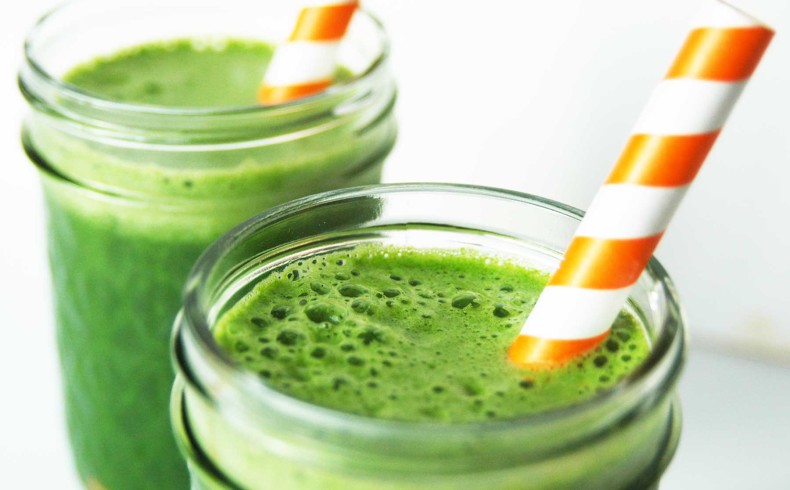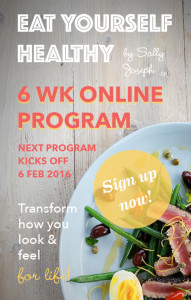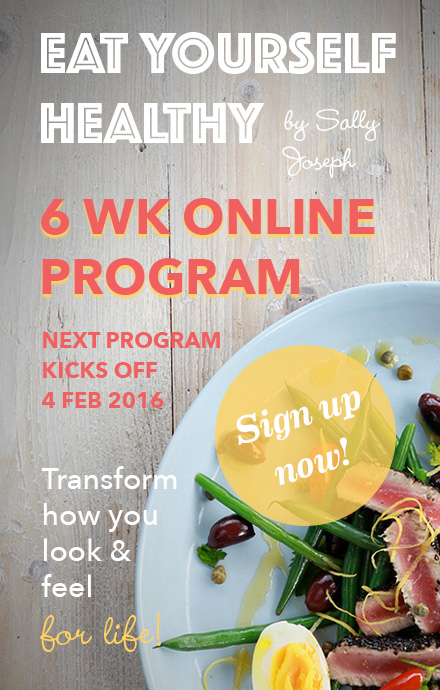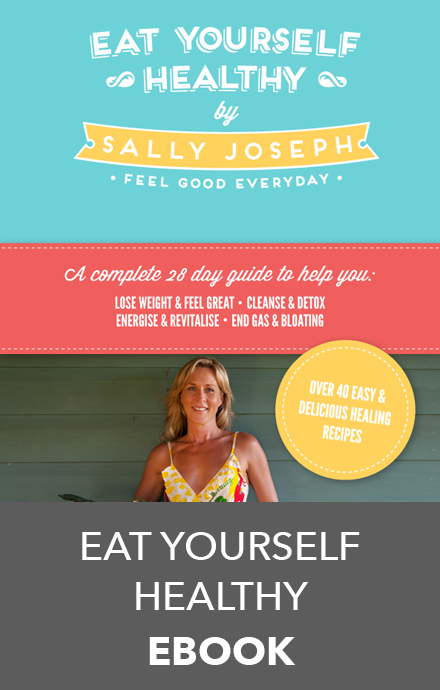
There’s no doubt that going sugar free has become all the rage, and I have to admit I’m partly to blame, considering I’ve been putting 1000’s of patients, (including Sarah Wilson, founder of the I Quit Sugar movement) on my Eat Yourself Healthy program for the past 16 years. I’ve also experienced first hand, the powerful and life changing effects of adopting a low sugar diet – since recovering from Chronic Fatigue Syndrome, Hashimoto’s and Lupus, prior to becoming a Nutritionist. Since then, I’ve gone on to witness the same incredible results in many of my patients, who’ve overcome everything from chronic illness, to unexplained infertility, even depression and anxiety, not to mention the kilos of excess weight, PMS and bad skin they’ve lost along the way!
Nowadays it seems every man and his dog is going gluten and sugar free in a quest to reach their pinnacle of health, and whilst I feel this can only be a good thing, I’m admittedly concerned about the number of folks who are still (unknowingly) confused about sugar. I constantly see recipes and posts all over the web and social media from people claiming they’re eating “sugar free” or “healthy” sugars, by replacing refined sugar with natural forms of sugar like honey or dates. Now, don’t get me wrong, eliminating processed foods and refined sugar from your diet is definitely a good thing, but what many are failing to understand is the science behind how the body responds to various types of sugar, including natural forms. Whether it’s refined or natural sources of sugar – like the banana or coconut water you may be adding to your morning smoothie, or the raw vegan desserts loaded with medjool dates, or gluten free cookies sweetened with rice malt syrup that you’re eating in the belief they’re either sugar free, or totally guilt free – these are ALL sources of sugar, and will most definitely contribute to excess weight gain and inflammation, if you consume too much, too often!
But is it any wonder so many of us are being fooled into thinking we’re eating ‘sugar free’, when we’re constantly bombarded with supposed sugar free recipes and products at every click of the mouse button! Just the other day I came across a recently released cookbook, written by a celebrity Nutritionist, claiming all her recipes were “sugar free”, but a quick flick to the dessert section revealed they were actually packed with various forms of sugar from ingredients such as medjool dates, maple syrup and honey! I hate to break it to you folks, but last time I checked the nutrition text books, these are ALL forms of sugar! So if the supposed health experts are telling us their recipes are sugar free, what chance do we stand in our plight to truly cut back on the sweet stuff, and is it even realistic to think we can be totally sugar free in the first place?
For one, the body actually needs a certain amount of glucose to function – primarily the brain – which is the biggest consumer of glucose. Furthermore, all fruits and even vegetables contain varying amounts of sugar in the form of fructose – albeit natural – vs the processed form of fructose added to many packaged and fast foods. Aiming to be 100%, or close to sugar free, is not only near impossible, but actually unhealthy as this would mean avoiding all fruits and vegetables, in addition to the processed forms of fructose. Whilst I advocate avoiding all processed forms of fructose – such as high fructose corn syrup 100% of the time – I also recommend closely monitoring your intake of natural sugar sources, including sweeteners like honey, maple syrup and coconut sugar, as well as fresh fruit. As a Nutritionist, I recommend consuming no more than 2 pieces of fresh fruit per day, (particularly if you are trying to lose weight, or even less if you are trying to reduce Candida overgrowth), and predominantly from low to medium fructose fruits, like berries, kiwi, plums, lemons and grapefruits. Save the high fructose fruits such as medjool dates, mangoes and grapes for occasional treats and definitely avoid dried fruit – with the exception of goji berries.
In an effort to help you assess just how much sugar you may actually be eating, I’ve listed my top 3 tips for keeping your sugar intake down:
- Natural sugars are still sugar! – It doesn’t matter if you’re eating whole fruit, maple syrup, sugar cane, honey, rapadura sugar, or rice malt syrup, these are ALL forms of sugar, whether they are a combination of fructose and glucose, or 100% glucose ( as is the case with rice malt syrup). Just because they’re not ‘refined’ sources of sugar, does not mean they’re exempt from spiking your insulin levels, packing on the pounds, or feeding Candida overgrowth within your gut if you eat too much! Although natural sugars may redeem some valuable nutrients compared to refined sugar, you’re far better off relying on green leafy vegetables for these, than trying to supplement your nutrient intake with those found in natural sugars!
- Just because your smoothie is GREEN does not mean it will make you lean – I’ll admit the green smoothie trend is one of my all time pet peeves when it comes to supposed ‘healthy’ or ‘natural’ sugars, for the simple fact that we’ve been lured into thinking that adding a couple of spinach or kale leaves to a smoothie, automatically classifies it as “healthy”, when infact the addition of several pieces of fruit, along with fruit juice or coconut water and even honey, can equate to the same amount of sugar as contained in a can of coke! A typical smoothie recipe like this can equate to as much as 45 grams of sugar – around 11 teaspoons! (A 375ml can of coke contains 10 tsps of sugar).
My tip – stick to smoothie recipes that contain no more than 1 – 2 types of fruit – preferably low sugar fruits like berries & only use a small banana or half a large, and avoid smoothies made on fruit juice or bottled coconut water. Instead choose unsweetened nut or coconut milk as your base – even water can often suffice!
- Don’t be fooled by recipes or products claiming to be ‘sugar free’ – As I mentioned, it doesn’t matter if the source of sugar is refined or unrefined, sweeteners ranging from organic cane sugar, through to honey and rice malt syrup, as well as fruit – are ALL sources of sugar. Personally I refer to any of my recipes that contain fructose free sweeteners, like rice malt syrup, as ‘low sugar‘ or ‘fructose free‘, as this is a far more accurate description, than claiming a recipe with fruit, or natural sweeteners is ‘sugar free’. ‘Refined sugar free’ does not make a recipe or product low in sugar, or that much healthier either. The only exception for sugar free sweeteners is stevia. Remember fructose free sweeteners like rice malt syrup, still contain glucose – which stimulates insulin production – and the more you consume, the more insulin you produce, and the more insulin you produce, the more fattening and pro inflammatory the food!
My Tip – I rarely, if ever add medjool dates to any of my recipes, because, as delicious and gooey as they are, they still pack a punch when it comes to their sugar content ( of which 30% is fructose) at 4.5 grams per date. (1 tsp of sugar contains 4.2 grams of sugar) Considering your average dessert, or smoothie recipe contains anywhere from 4 to 1 cup of dates, in addition to other sources of fruit, this can add up to a hefty serve of the sweet stuff!
If you really want to quit sugar and fix your digestion in 2016, then cut through the confusion and learn from a professional and sign up to my 6WK Eat Yourself Healthy online Program and find out exactly what to eat for a healthy gut and slim butt!
Click above to find out more
Copyright Sally Joseph 2016, All Rights reserved


Health & Lifestyle Tips
Delicious Healthy Recipes
Educational & Recipe Videos









